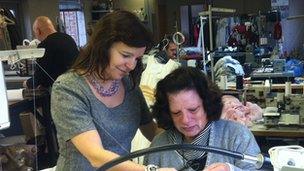Smallest businesses need more support, say MPs
- Published

Micro businesses say they do not have the resources to deal with some legislation
Britain's smallest businesses should be treated differently from other small and medium-sized firms, according to a group of MPs.
The very smallest companies are the UK's job creators, but many are stifled by red tape and regulations aimed at much bigger companies, they said.
The All Party Group for Micro Businesses said the definition of a micro business should be changed.
This would enable more targeted legislation and support.
The government rejected the call for a new definition of the sector.
'Tailored policies'
The UK government currently accepts the EU definition that a micro business is a company employing fewer than ten people with a turnover of less than 2m euros (£1.7m; $2.7m).
But the MPs said the definition is too wide for the British economy, because 95% of UK companies qualify as micro businesses.
"The consequence of this lack of definition has been an inability of government to create policy tailored toward this group," according to the report.
"Such a group is too large in number and share of the economy and too diverse in nature for cohesive policy making."
The MPs argue that, instead, a micro business should be defined as a company employing fewer than five people.
They cite various examples from around the world of countries moving towards a tighter definition.
The report suggests a favourable tax regime to encourage micro businesses to take on new employees and enable better access to finance, and simplified regulation.
Anne Marie Morris MP, who set up the group, told the BBC that micro businesses could be an important engine for growth.
"In America, the evidence is that 90% of all new jobs created after their last downturn was exactly in this sector," she said.
'Different world'
A number of micro businesses have welcomed the report.
"We're not ignored by government, we are invisible to government," said Hayley Chalmers, who runs Short Couture, a one person online business selling office clothes to women who are 5 foot 4 or under.
"The world is very, very different for a sole trader, or a company of three or four employees. We don't have the resources to deal with EU or UK government legislation.
"We don't have the money to cope with all the tax, the regulations, and the red tape. Unless there's a better definition [of a micro business], they cannot address us separately."
However, the MP's call for a new definition for micro businesses was rejected by the government.
Business and Enterprise Minister Mark Prisk said: "I believe excluding businesses employing between five and nine employees from this definition may have a detrimental effect on a significant number of businesses, as they could miss out on several current exemptions based on size of business, such as the three-year moratorium on new domestic regulation for micro businesses and start-ups."
- Published2 November 2011
- Published11 July 2011
- Published7 June 2011
- Published18 March 2011